牛津译林版七年级英语下册期末专项练习:改写句子(含解析)
文档属性
| 名称 | 牛津译林版七年级英语下册期末专项练习:改写句子(含解析) | 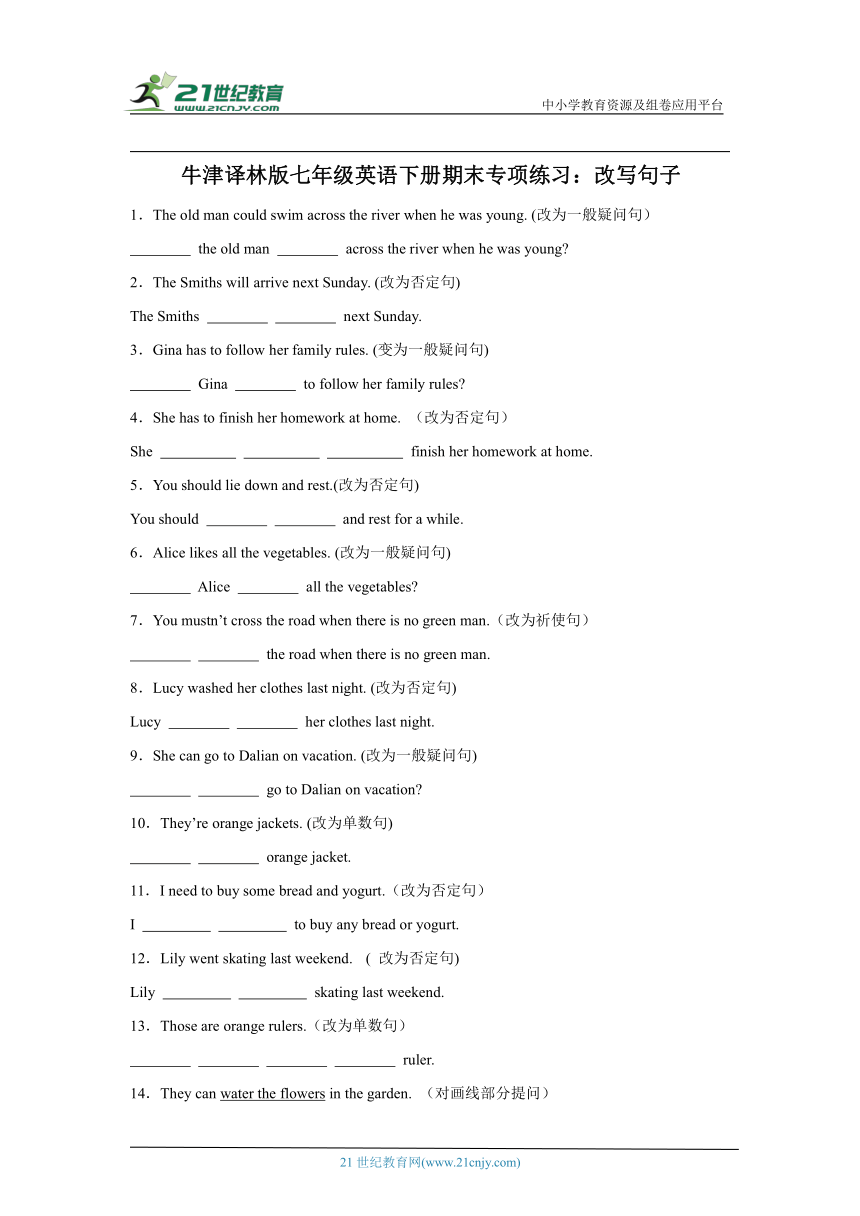 | |
| 格式 | docx | ||
| 文件大小 | 412.8KB | ||
| 资源类型 | 试卷 | ||
| 版本资源 | 牛津译林版 | ||
| 科目 | 英语 | ||
| 更新时间 | 2024-05-13 14:06:31 | ||
图片预览

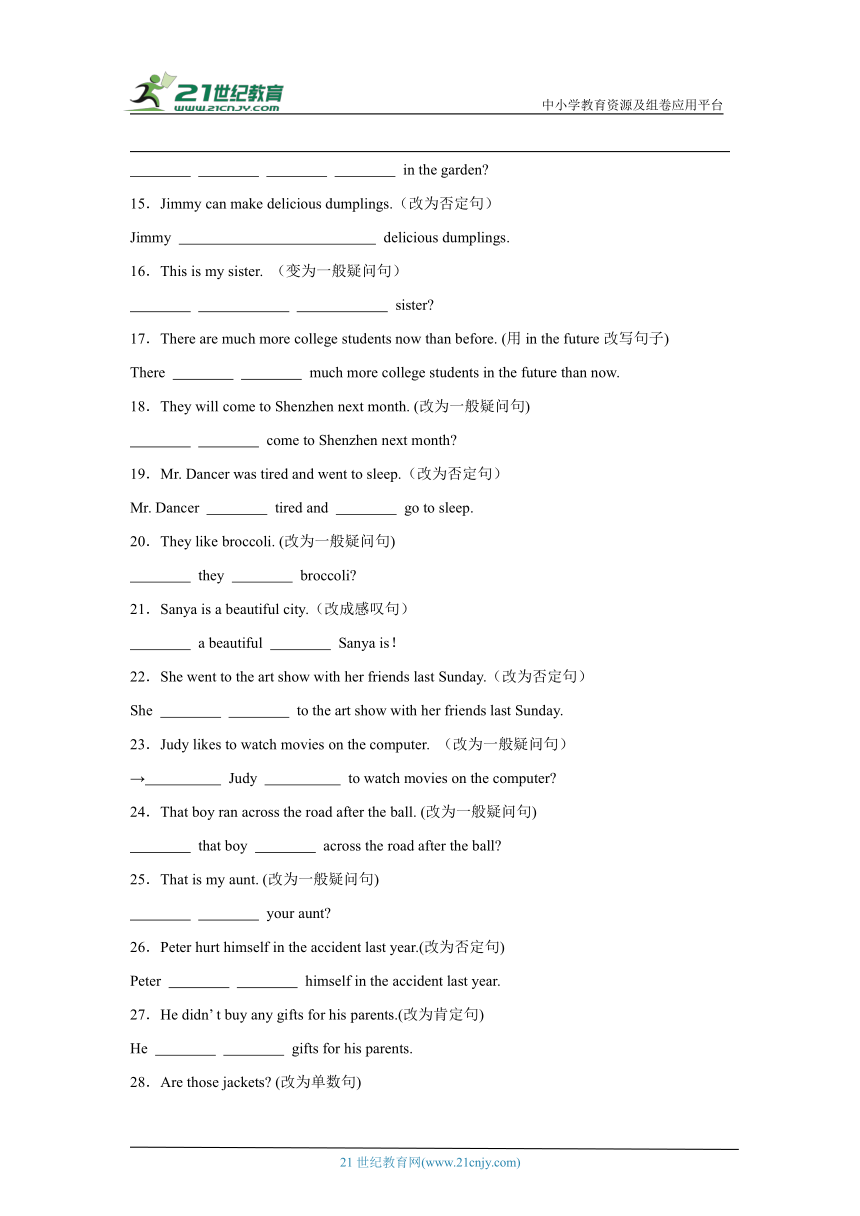
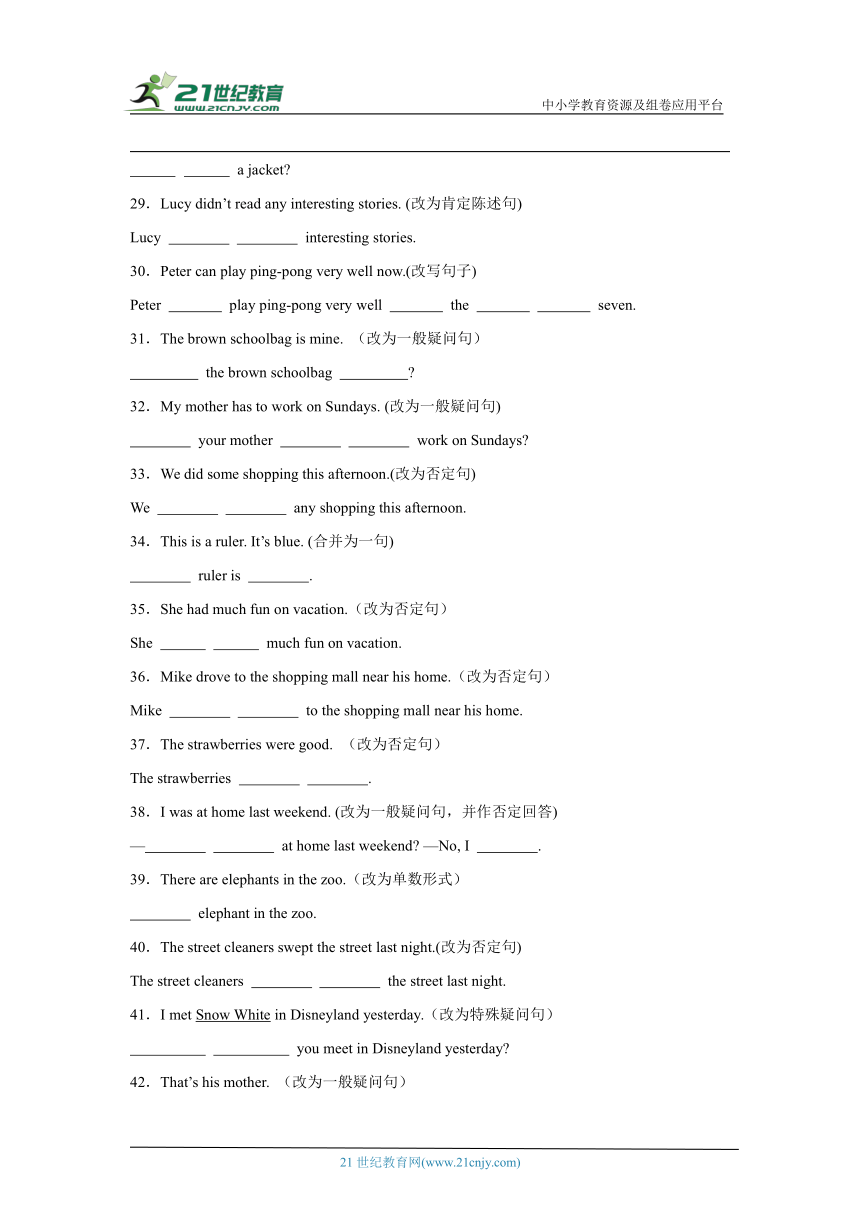
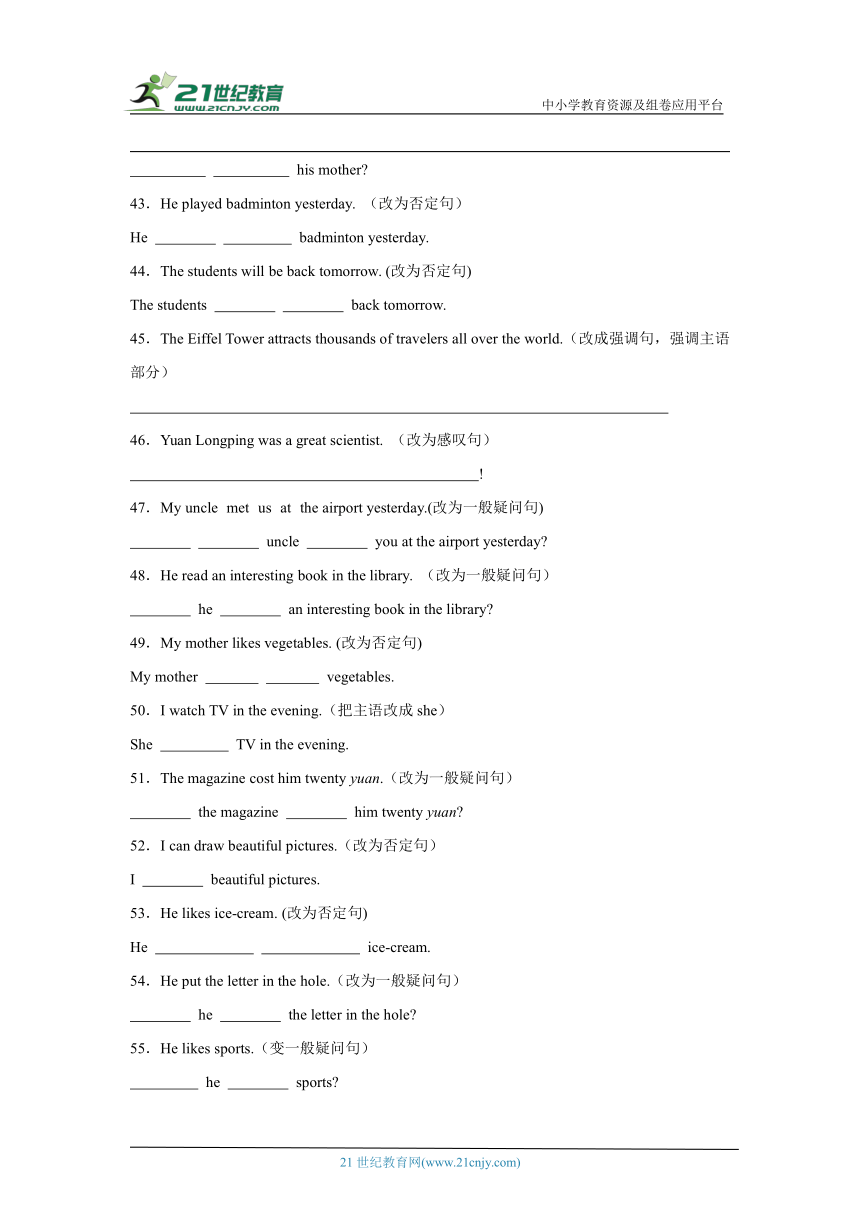
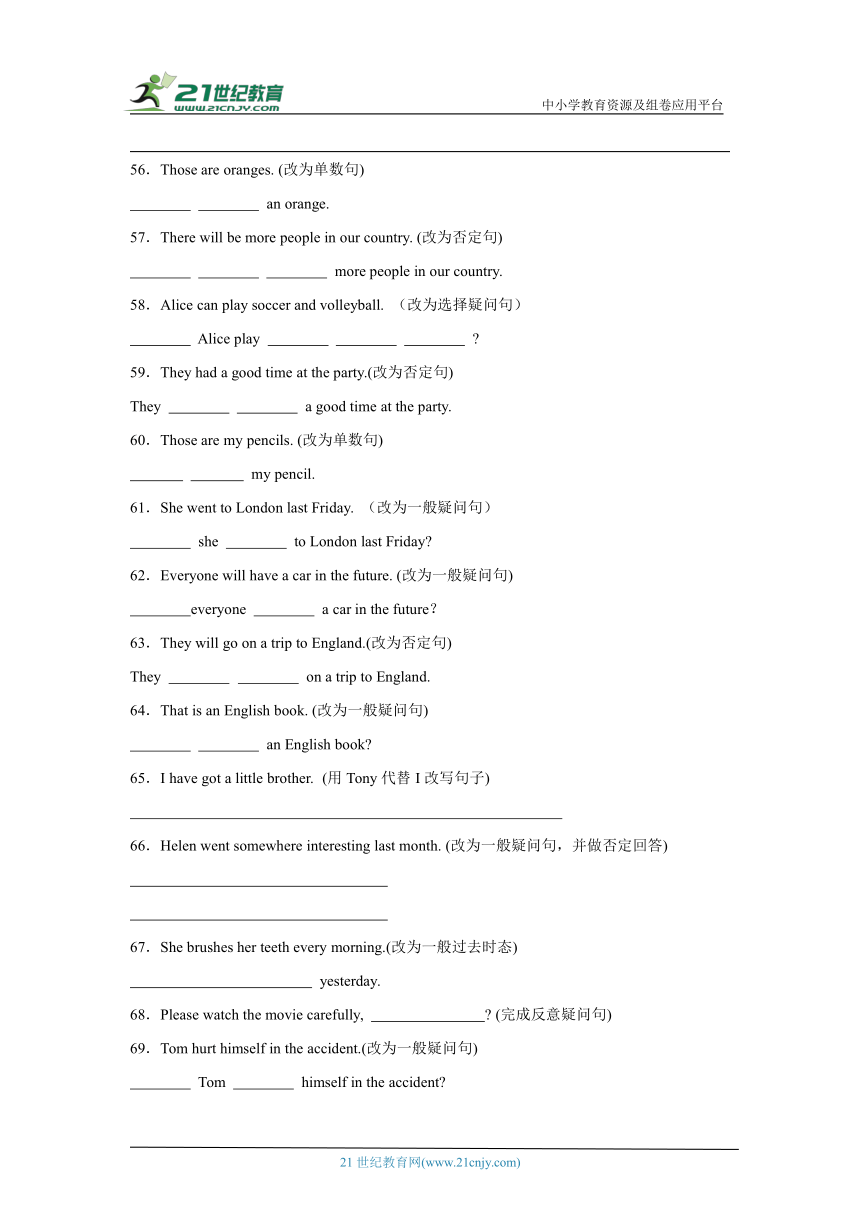
文档简介
中小学教育资源及组卷应用平台
中小学教育资源及组卷应用平台
牛津译林版七年级英语下册期末专项练习:改写句子
1.The old man could swim across the river when he was young. (改为一般疑问句)
the old man across the river when he was young
2.The Smiths will arrive next Sunday. (改为否定句)
The Smiths next Sunday.
3.Gina has to follow her family rules. (变为一般疑问句)
Gina to follow her family rules
4.She has to finish her homework at home. (改为否定句)
She finish her homework at home.
5.You should lie down and rest.(改为否定句)
You should and rest for a while.
6.Alice likes all the vegetables. (改为一般疑问句)
Alice all the vegetables
7.You mustn’t cross the road when there is no green man.(改为祈使句)
the road when there is no green man.
8.Lucy washed her clothes last night. (改为否定句)
Lucy her clothes last night.
9.She can go to Dalian on vacation. (改为一般疑问句)
go to Dalian on vacation
10.They’re orange jackets. (改为单数句)
orange jacket.
11.I need to buy some bread and yogurt.(改为否定句)
I to buy any bread or yogurt.
12.Lily went skating last weekend. ( 改为否定句)
Lily skating last weekend.
13.Those are orange rulers.(改为单数句)
ruler.
14.They can water the flowers in the garden. (对画线部分提问)
in the garden
15.Jimmy can make delicious dumplings.(改为否定句)
Jimmy delicious dumplings.
16.This is my sister. (变为一般疑问句)
sister
17.There are much more college students now than before. (用in the future改写句子)
There much more college students in the future than now.
18.They will come to Shenzhen next month. (改为一般疑问句)
come to Shenzhen next month
19.Mr. Dancer was tired and went to sleep.(改为否定句)
Mr. Dancer tired and go to sleep.
20.They like broccoli. (改为一般疑问句)
they broccoli
21.Sanya is a beautiful city.(改成感叹句)
a beautiful Sanya is!
22.She went to the art show with her friends last Sunday.(改为否定句)
She to the art show with her friends last Sunday.
23.Judy likes to watch movies on the computer. (改为一般疑问句)
→ Judy to watch movies on the computer
24.That boy ran across the road after the ball. (改为一般疑问句)
that boy across the road after the ball
25.That is my aunt. (改为一般疑问句)
your aunt
26.Peter hurt himself in the accident last year.(改为否定句)
Peter himself in the accident last year.
27.He didn’ t buy any gifts for his parents.(改为肯定句)
He gifts for his parents.
28.Are those jackets (改为单数句)
a jacket
29.Lucy didn’t read any interesting stories. (改为肯定陈述句)
Lucy interesting stories.
30.Peter can play ping-pong very well now.(改写句子)
Peter play ping-pong very well the seven.
31.The brown schoolbag is mine. (改为一般疑问句)
the brown schoolbag
32.My mother has to work on Sundays. (改为一般疑问句)
your mother work on Sundays
33.We did some shopping this afternoon.(改为否定句)
We any shopping this afternoon.
34.This is a ruler. It’s blue. (合并为一句)
ruler is .
35.She had much fun on vacation.(改为否定句)
She much fun on vacation.
36.Mike drove to the shopping mall near his home.(改为否定句)
Mike to the shopping mall near his home.
37.The strawberries were good. (改为否定句)
The strawberries .
38.I was at home last weekend. (改为一般疑问句,并作否定回答)
— at home last weekend —No, I .
39.There are elephants in the zoo.(改为单数形式)
elephant in the zoo.
40.The street cleaners swept the street last night.(改为否定句)
The street cleaners the street last night.
41.I met Snow White in Disneyland yesterday.(改为特殊疑问句)
you meet in Disneyland yesterday
42.That’s his mother. (改为一般疑问句)
his mother
43.He played badminton yesterday. (改为否定句)
He badminton yesterday.
44.The students will be back tomorrow. (改为否定句)
The students back tomorrow.
45.The Eiffel Tower attracts thousands of travelers all over the world.(改成强调句,强调主语部分)
46.Yuan Longping was a great scientist. (改为感叹句)
!
47.My uncle met us at the airport yesterday.(改为一般疑问句)
uncle you at the airport yesterday
48.He read an interesting book in the library. (改为一般疑问句)
he an interesting book in the library
49.My mother likes vegetables. (改为否定句)
My mother vegetables.
50.I watch TV in the evening.(把主语改成she)
She TV in the evening.
51.The magazine cost him twenty yuan.(改为一般疑问句)
the magazine him twenty yuan
52.I can draw beautiful pictures.(改为否定句)
I beautiful pictures.
53.He likes ice-cream. (改为否定句)
He ice-cream.
54.He put the letter in the hole.(改为一般疑问句)
he the letter in the hole
55.He likes sports.(变一般疑问句)
he sports
56.Those are oranges. (改为单数句)
an orange.
57.There will be more people in our country. (改为否定句)
more people in our country.
58.Alice can play soccer and volleyball. (改为选择疑问句)
Alice play
59.They had a good time at the party.(改为否定句)
They a good time at the party.
60.Those are my pencils. (改为单数句)
my pencil.
61.She went to London last Friday. (改为一般疑问句)
she to London last Friday
62.Everyone will have a car in the future. (改为一般疑问句)
everyone a car in the future?
63.They will go on a trip to England.(改为否定句)
They on a trip to England.
64.That is an English book. (改为一般疑问句)
an English book
65.I have got a little brother. (用Tony代替I改写句子)
66.Helen went somewhere interesting last month. (改为一般疑问句,并做否定回答)
67.She brushes her teeth every morning.(改为一般过去时态)
yesterday.
68.Please watch the movie carefully, (完成反意疑问句)
69.Tom hurt himself in the accident.(改为一般疑问句)
Tom himself in the accident
70.She worked in China last year.(改为一般疑问句)
71.He often plays tennis on the playground in the morning.(用next Sunday替换in the morning 改写句子)
He tennis on the playgroun next Sunday.
72.They are going to play soccer this afternoon.(改为否定句)
They to play soccer this afternoon.
73.He doesn’t like strawberries. (用the boys代替he改写句子)
The boys strawberries.
74.He doesn’t have an apple.(用this morning改写)
He no this morning.
75.Su Hai took some photos on the Sports Day.
否定句:
一般疑问句:
肯定及否定回答:
对画线部分提问:
76.Let’s go to the Grand Theatre. (改为一般疑问句)
go to the Grand Theatre
77.The mouse made house under the ground. (改为一般疑问句)
the mouse a house under the ground
78.The students are swimming in the river now. (用this afternoon替换now)
The students in the river this afternoon.
79.He has a long neck.(改为复数形式)
long .
80.David visited his uncle with his parents last month.(改为一般疑问句)
David his uncle with his parents last month
81.Tom likes fruit salad. (改为一般疑问句)
Tom fruit salad
82.They will meet at the bus stop at 10:30 a.m. (改为一般疑问句)
meet at the bus stop at 10:30 a.m.
83.We have to arrive at the airport before nine. (改成否定句)
We arrive at the airport before nine.
84.My brother can play football. (改为一般疑问句)
brother play football
85.You can’t leave your daughter alone at home.(改为同义句)
You can’t leave your daughter at home.
86.My dad bought a watch for me two days ago. (改为一般疑问句)
your dad a watch for you two days ago
87.Someone got hit on the head. (改为一般疑问句)
hit on the head
88.Those are English books.(改为单数)
is an English .
89.Andy did something important for me yesterday. (改为否定句)
Andy important for me yesterday.
90.Her grandparents live in the city. (用in the country完成选择疑问句)
her grandparents the city in the
91.We are going to visit the Disneyland in Hong Kong next week. (改为否定句)
We going to the Disneyland in Hong Kong next week.
92.This is my watch. (改为复数句)
are my .
93.My mother can play computer games. (用last year改写句子)
My mother play computer games last year.
94.These are books. (改为单数句)
a book.
95.I could hear and see the guide. (改为否定句)
I hear see the guide.
96.Tom is twelve years old. He is a student. (合并为一句)
Tom is a student.
97.Century Park is very beautiful.(改为感叹句)
beautiful Century Park !
98.The pencil box is in the schoolbag. (改为一般疑问句)
the pencil box the schoolbag
99.There is somebody in the room. (改为—般疑问句)
in the room
100.He went to see his friend yesterday. (改为一般疑问句)
he to see his friend yesterday
中小学教育资源及组卷应用平台
中小学教育资源及组卷应用平台
21世纪教育网(www.21cnjy.com)
21世纪教育网(www.21cnjy.com)
参考答案:
1. Could swim
【详解】句意:这位老人年轻时能游过这条河。could是情态动词,变为一般疑问句,把could提到句首,后加动词原形swim。故填Could;swim。
2. won’t arrive
【详解】句意:Smith一家将在下周日到达。这句话使用的是一般将来时,否定形式应直接在will后加not,缩写为won’t,后面的动词仍用原形。
3. Does have
【详解】句意:吉娜必须遵守她的家庭规则。根据“has to”可知,句子时态为一般现在时,主语为第三人称单数,改为一般疑问句应借助助动词does并放在句首,大写句首字母,助动词后的动词为原形。故填Does;have。
4. doesn’t have to
【详解】句意:她必须在家完成作业。根据“has to”可知改为否定句时要借助助动词doesn’t,其后用动词原形have。故填doesn’t;have;to。
5. shouldn’t lie
【详解】句意:你应该躺下休息。本句含情态动词should,改为否定句在情态动词后加not,后接动词原形。故填shouldn’t;lie。
6. Does like
【详解】句意:Alice喜欢所有的蔬菜。考查陈述句变一般疑问句。一般疑问句的结构为“be动词/助动词/情态动词+主语+其它”,原句的谓语动词“likes”为实义动词第三人称单数,所以应用助动词do的第三人称单数形式does,位于句首首字母需要大写,其后应用动词原形,故填Does;like。
7. Don’t cross
【详解】句意:没有绿灯的时候你不能过马路。根据“You mustn’t ...”可知要改为祈使句的否定形式,其结构为“Don’t+动词原形+其他”。故填Don’t;cross。
8. didn’t wash
【详解】这里是一般过去时态的肯定句变成否定句,要借助助动词did+not+动词的原形。根据题意,故填didn’t ;wash。
9. Can she
【详解】句意:她假期里会去大连度假。一般疑问句的结构是be动词/助动词+主语+其他。题干中有情态动词can直接放到句首;主语she放情态动词后。故填Can;she。
10. It’s an
【详解】句意:它们是橙色的夹克。they,它们,对应的单数词为it,它;are对应的单数词为is;jackets夹克,复数名词,单数形式为jacket,单数可数名词之前应用不定冠词表示泛指,orange以元音因素开头,故应用an;it和is要缩写成it’s,句首首字母大写,故填It’s;an。
11. don’t need
【详解】句意:我需要买些面包和酸奶。根据所给的句子,找到谓语“need”,变否定句,实义动词前面加“助动词+not”,后面跟动词原形,由于本句主语是I,所以用don’t。故填don’t;need。
12. didn’t go
【详解】句意:Lily上周末去滑冰了。本句时态为一般过去时,一般过去时的否定句句型为:主语+didn’t+动词原形+其他,此处需用助动词didn’t,谓语动词用动词原形go。故填didn’t;go。
13. That is an orange
【详解】句意:那些是橙色的尺子。指示代词those的单数形式是that;对应的系动词是is;名词变成单数“ruler”时,要用不定冠词修饰,“orange”是元音音标开头的单词,所以这里要用an修饰,故填That is an orange。
14. What can they do
【详解】句意:他们可以在花园里给花浇水。划线部分water the flowers表示做事的内容,应用what引导的特殊疑问句来提问。后接一般疑问句语序,即情态动词can后接主语they,再接动词原形do。故填What;can;they;do。
15.can’t make
【详解】句意:Jimmy会做美味的饺子。原句为含情态can的肯定句,否定句结构为:主语+can’t+动词原形+其他。故填can’t make。
16. Is this your
【详解】句意:这是我的姐姐。变成一般疑问句,将be动词放在句首,再接this,原句的“my”在问句中变成your表示“你的”。句首首字母i大写。故填Is;this;your。
17. will be
【详解】句意:现在的大学生比以前多得多。in the future是一般将来时的时间状语,There be...句型的一般将来时形式为There will be...。故填will;be。
18. Will they
【详解】句意:他们下个月将会去深圳。原句是含有助动词will的陈述句,变一般疑问句只需将其提到主语they之前即可,即will they。故填Will;they。
19. wasn’t didn’t
【详解】句意:丹瑟先生很累了,去睡觉了。根据题目要求句子要改为否定句,并列句前一句be动词后加not;并列句后一句谓语动词为实义动词,变否定须在动词原形前面加didn’t。故填wasn’t;didn’t。
20. Do like
【详解】句意:他们喜欢西兰花。根据题意是变成一般疑问句,like是谓语动词,主语是they,一般现在时态,变成一般疑问句,要借助助动词do,其结构是Do+主语+动词原形+其它?故填Do;like。
21. What city
【详解】句意:三亚是一个美丽的城市。根据题干可知,改为感叹句的结构为:What+a+形容词+单数名词+主谓!city“城市”,被a修饰,用单数形式,故填What;city。
22. didn’t go
【详解】句意:她上周日和她的朋友去了艺术展。考查肯定句变否定句。根据原句中“went”可知,原句时态为一般过去时。根据题目要求,要改为否定句,所以要借助助动词did,did和not缩写为didn’t,然后变否定句时,动词went要改为动词原形go。故填didn’t;go。
23. Does like
【详解】句意:朱迪喜欢在电脑上看电影。原句是一般现在时,主语是第三人称单数“Judy”,谓语动词是实义动词likes“喜欢”,改为一般疑问句,需要借助助动词does,实义动词用原形like。故填Does;like。
24. Did run
【详解】句意:那个男孩追着球跑过马路。根据“ran”可知句子用一般过去时,变疑问句时借助助动词did,后加动词原形run。故填Did;run。
25. Is that
【详解】句意:那是我的姑姑。原句是含系词is的肯定句,变为一般疑问句需把is提至句首并大写首字母,故填Is;that。
26. didn’t hurt
【详解】句意:彼得在去年的事故中受伤了。原句含有实义动词hurt,时态是一般过去时,变否定句助动词用didn’t,后跟动词原形。故填didn’t;hurt。
27. bought some
【详解】句意:他没有为他的父母买礼物。考查肯定的陈述句。原句时态为一般过去时,所以谓语动词buy应使用过去式bought;否定句中的 any应变回some。故填bought;some。
28. Is that
【详解】句意:那些是夹克吗?Are的单数是Is,those的单数是that。故填Is;that。
29. read some
【详解】句意:露西没有读任何有趣的故事。原句是否定句,变成肯定句时助动词要去掉,时态用一般过去时,read的过去式是read,否定句中的any要变成some,故填read;some。
30. could at age of
【详解】句意:彼得现在乒乓球打得很好。根据改写后的句子句末有seven,可知想改为“彼得7岁时乒乓球打得好”。at the age of seven意为“7岁时”,情态动词can要用过去时could,故填could;at;age;of。
31. Is yours
【详解】句意:棕色的书包是我的。原句有be动词is,变成一般疑问句,把is提到主语前,位于句首需大写首字母,同时mine“我的”要变成yours“你的”,故填Is;yours。
32. Does have to
【详解】句意:我妈妈星期天不得不去工作。句子是一般现在时,主语是第三人称单数,疑问句需借助助动词does,同时动词用原形。故填Does;have;to。
33. didn’t do
【详解】句意:我们今天下午购物了。原句含有实义动词did,变否定句,需借助助动词didn’t,实义动词还原为do。故填didn’t;do。
34. This blue
【详解】句意:这是一把尺子。它是蓝色的。合并为:这把尺子是蓝色的。this“这个”修饰单数名词ruler,blue是形容词作表语,故填This;blue。
35. didn’t have
【详解】句意:她假期过的很愉快。根据had可知是一般过去时态,变否定句需借助助动词did,然后had还原成动词原形have。故答案为didn't have。
36. didn’t drive
【详解】句意:迈克开车去他家附近的购物中心。对实义动词的否定要借助助动词,原句动词drove为过去式,助动词应该用did,其否定形式为didn’t;其前有助动词,其后动词用原形,drove的原形为drive。故填didn’t;drive。
37. weren’t good
【详解】句意:草莓很好。原句是一般过去时。改成否定句,用be动词的否定形式“weren’t”,用形容词“good”作表语。故填weren’t;good。
38. Were you wasn’t
【详解】句意:上周末我在家。原句用一般过去时,动词是be动词,变成疑问句直接把be动词提到主语前,第一人称I要变成第二人称you,对应的be动词用were,位于句首的单词,首字母要大写;回答也用be动词,主语为I,be动词用was,was与not可以缩写成wasn’t,故填Were;you;wasn’t。
39.There’s an/There is an
【详解】句意:动物园里有大象。There are“有”复数,一般现在时态,单数是There is,可缩写为There’s。这里泛指一头大象,elephant是以元音音素/e/开头,用an修饰。故填There’s an/There is an。
40. didn’t sweep
【详解】句意:街道清洁工昨晚清扫了街道。swept是实义动词,是sweep的过去式,变否定句时需要借助于助动词do,根据时态是一般过去时,因此用did not,缩写为 didn’t,后面跟动词原形。故填 didn’t;sweep。
41. Who did
【详解】句意:昨天我在迪斯尼乐园遇到了白雪公主。划线部分是“白雪公主”,所以对其提问用特殊疑问词who,句子时态是一般过去时,有实义动词met,疑问句借助助动词did。故填Who;did。
42. Is that
【详解】句意:那是他的妈妈。由“That’s…”可知,本句为一般现在时;主语his mother为第三人称单数,故应将be动词is提前引导一般疑问句。故填Is;that。
43. didn’t play
【详解】句意:他昨天打了羽毛球。原句谓语动词是过去式played,否定句用didn’t+动词原形,故填didn’t;play。
44. won’t be
【详解】句意:学生们明天将不会回来。本句是含有“will”的一般将来时,变否定句时,在其后加not,可缩略成won’t。故填won’t;be。
45.It is the Eiffel Tower that attracts thousands of travelers all over the world.
【详解】句意:埃菲尔铁塔吸引了世界各地成千上万的游客。原句是陈述句,改成强调句,强调主语部分,可使用句型:It is/was + 被强调部分+ that + 其他部分;根据句中的“attracts”可知,句子时态为一般现在时,改写后的句子时态也为一般现在时;原句主语为the Eiffel Tower;即It is the Eiffel Tower that attracts thousands of travelers all over the world. 故填 It is the Eiffel Tower that attracts thousands of travelers all over the world.
46.How great a scientist Yuan Longping was/What a great scientist Yuan Longping was
【详解】句意:袁隆平是一位伟大的科学家。观察句子结构以及“a great scientist”可知,句子可用感叹词修饰“great”,符合how引导感叹句结构:How+形容词+a/an+可数名词单数+主语+谓语!此结构可与what 引导的感叹句:what+a/an+形容词+可数名词单数+主语+谓语!。故填How great a scientist Yuan Longping was/What a great scientist Yuan Longping was。
47. Did your meet
【详解】句意:我叔叔昨天在机场接了我们。根据“met”是实义动词且时态是一般过去时,变一般疑问句时,用助动词did,后面接动词原形,met的原形是meet,首字母大写,变疑问句时要把my变成your,故填Did;your;meet。
48. Did read
【详解】句意:他在图书馆读了一本有趣的书。原句是一般过去时,且句子有实意动词,变成一般疑问句,需借助助动词did,同时动词用原形,故填Did;read。
49. doesn’t like
【详解】句意:我妈妈喜欢蔬菜。根据“likes”可知变否定句时借助助动词doesn’t,后加动词原形like。故填doesn’t;like。
50.watches
【详解】句意:我在晚上看电视。句子是一般现在时,she“她”,第三人称单数作主语,谓语动词watch相应地用单数形式watches。故填watches。
51. Did cost
【详解】句意:这本杂志花了他20元钱。原句是含有实义动词的一般过去时,改为一般疑问句要在句首添加助动词did,且首字母要大写,后面的谓语动词用原形。cost的过去式和动词原形一样。故填Did;cost。
52.can’t draw
【详解】句意:我会画漂亮的画。含有情态动词的句子,改否定句时要在情态动词后加not,can not缩写为can't,其后动词原形不变。故填can't draw。
53. doesn’t like
【详解】句意:他喜欢冰淇淋。原句时态是一般现在时,还有实意动词likes,变否定句需要借助助动词doesn’t,后跟动词原形。故填doesn’t;like。
54. Did put
【详解】句意:他把信放进邮筒里。根据题意变成一般疑问句,主语是he,动词是put,说明此处是一般过去时态,变成一般疑问句,要借助助动词did,其结构是“Did+主语+动词原形+其他?”故填Did;put。
55. Does like
【详解】句意:他喜欢运动。原句是含有实义动词的一般现在时, 主语是第三人称单数,变一般疑问句要在句首添加助动词does,后面用动词原形。位于句首,首字母大写。故填Does;like。
56. That is
【详解】句意:那些是橙子。those对应的单数是that,are对应的单数是is,故填That;is。
57. There won’t be
【详解】句意:在我们国家将会有更多的人。原句为一般将来时的陈述句,will为助动词,变否定句需要在will后加not,will not=won’t。故填There;won’t;be。
58. Can soccer or volleyball
【详解】考查选择疑问句,根据题目要求,可知选择意思是在“soccer足球”和“volleyball排球”之间选择,可知“or或者”表示选择,变选择疑问句时,需将情态动词“can”提到句首。故填Can; soccer;or;volleyball。
59. didn’t have
【详解】句意:他们在聚会上玩得很开心。原句时态是一般过去时,变否定句要借助助动词didn’t来完成,后跟动词原形,即had变成have。故填didn’t;have。
60. That is
【详解】句意:那些是我的铅笔。改为单数句,指示代词those改为that,are改为is。故填That;is。
61. Did go
【详解】句意:她上星期五去了伦敦。根据“last Friday”可知,时态为一般过去时,改为一般疑问句要用助动词Did提问,后面接动词原形。故填Did;go。
62. Will have
【详解】句意:每个人在未来都会有一辆车么?
一般将来时的一般疑问句的结构是will+主语+be动词/动词原形 +其他。所以第一空填will,第二空填动词原形have。故答案填Will have。
63. won’t go
【详解】句意:他们将去英国旅行。本句是含有will的肯定句,变否定句需在will后加not。will not=won’t,故填won’t;go。
64. Is that
【详解】句意:那是一本英语书。原句中含有be动词“is”,变一般疑问句要放在主语前,句首首字母大写。故填Is;that。
65.Tony has got a little brother.
【详解】句意:我已经有了一个弟弟。Tony为第三人称单数,此处使用助动词has,其余都不变。故填Tony has got a little brother.
66. Did Helen go anywhere interesting last month No, she didn’t.
【详解】句意:上个月Helen去了一些有趣的地方。根据“last month”可知,此句时态是一般过去时,改成一般疑问句时,需将助动词提句首,谓语动词需原形。助动词用Did,went变成go,somewhere用于肯定句,而anywhere用于否定句和疑问句,故要改成anywhere。故第一个空填Did Helen go anywhere interesting last month 在作否定回答时,用代词she来代替Helen,故第二个空填No, she didn’t.故填Did Helen go anywhere interesting last month ;No, she didn’t.
67.She brushed her teeth
【详解】句意:她每天早晨刷牙。原句为一般现在时态,变为一般过去时,先将动词第三人称单数形式“brushes”还原,再变成动词过去式brushed,时间状语“every morning”由yesterday替代,其他不变。故填She brushed her teeth。
68.will you/won’t you
【详解】句意:请仔细看这部电影,好吗?陈述部分为祈使句时,附加问句一般情况下用will you 或won’t you。故填will you/won’t you。
69. Did hurt
【详解】句意:汤姆在事故中受伤了。由题干可知句子时态为一般过去时,“hurt”是实义动词,变一般疑问句需要借助于助动词did,位于句首首字母大写,助动词后跟动词原形hurt。故填Did;hurt。
70.Did she work in China last year
【详解】句意:去年她在中国工作。句中含有实义动词“worked”,此句为一般过去时,应用did构成一般疑问句,且将“worked”变为原形。故填Did she work in China last year
71. is going to play
【详解】句意:他经常在早晨在操场上打网球。时间状语改为“next Sunday”后,时态应该为一般将来时,根据空格数量,可知用结构be going to do。主语为he,be动词用is。故填is;going;to;play。
72. aren’t going
【详解】句意:今天下午他们打算踢足球。含有be动词的句子变为否定句,直接在be动词后加not,其它成分保持不变。本句中的be动词为are,变为否定句直接在are后加not,其缩写形式为aren’t;且其它成分保持不变,所以第二个空格填going。故填aren’t;going。
73. don’t like
【详解】句意:他不喜欢草莓。原句主语是第三人称单数,the boys是复数形式,此时的助动词否定形式应用don’t,动词用原形。故填don’t;like。
74. had apple
【详解】句意:他没有苹果。this morning是表示过去的时间状语,所以改写后的句子用一般过去时态,句中有表示否定的no,那么第一空应该用表示肯定意义的谓语动词had,no后面加名词apple,故填had;apple。
75. Su Hai didn’t take any photos on the Sports Day. Did Su Hai take any photos on the Sports Day Yes, he did./No, he didn’t. What did Su Hai do on the Sports Day
【解析】略
76. Shall we
【详解】句意:我们去大剧院吧。根据“Let’s”可知,改成一般疑问句要用助动词shall,主语用we,故填Shall;we。
77. Did make
【详解】句意:老鼠把房子建在地下。原句时态为一般过去时,且含有实义动词“made”,变一般疑问句助动词要用did,后接动词原形make。故填Did;make。
78. will swim
【详解】根据this afternoon可知,用一般将来时,一般将来时的结构为will do,故填will swim。
79. They have necks
【详解】句意:他有长长的脖子。原句主语是第三人称“He”,变成复数用they,主语是复数人称,谓语动词用原形,所以用have,名词“neck”的复数直接加s,故填They have,necks。
80. Did visit
【详解】句意:上个月大卫和他的父母去看望了他的叔叔。原句是一般过去时,变为疑问句,需借助助动词did,同时动词用原形,故填Did;visit。
81. Does like
【详解】句意:汤姆喜欢水果沙拉。原句是含有实义动词的一般现在时,主语是Tom,变成疑问句用助动词does,后接动词原形,故填Does;like。
82. Will they
【详解】句意:他们将于上午十点半在公共汽车站见面。原句中含有will,变为一般疑问句,把will提到they前即可。故填Will;they。
83. don't have to
【详解】句意:我们必须在9点前到达机场。句中有情态动词have to,主语“We”是复数形式,变否定句时要在have to前加don't,表示“不必”。故填don't have to。
84. Can your
【详解】句意:我哥哥会踢足球。原句含情态动词can,一般疑问句将can提到句首并大写首字母,my改为your。故填Can;your。
85. by herself
【详解】alone副词,单独、独自;by oneself单独,独力; herself她自己,与前文your daughter相对应。故答案为:by herself。
86. Did buy
【详解】句意:我爸爸两天前给我买了一块手表。原句时态为一般过去时,谓语动词是“bought”,变一般疑问句需借助助动词did,置于句首,过去式bought变为原形buy。故填Did;buy。
87.Did anyone get
【详解】句意:有人头部被击中了。get hit +on/in +the+身体部位的名词,表示 “某身体部位被撞击了”。原句为含有实义动词的陈述句,为一般过去时,应使用Did开头,助动词后加动词原形;someone改为anyone。故填Did anyone get。
88. That book
【详解】句意:那些是英语书。改为单数句意是,那个是英语书。those“那些”变为单数that“那个”;books“书”为复数形式,变为单数是“book”,首字母大写。故填That;book。
89. didn’t do anything
【详解】句意:安迪昨天为我做了一些重要的事。
原句中的did是do的过去式,为实义动词,变否定句时要借助didn’t,后跟动词原形do;肯定句中的something变否定句时要改为anything,故答案为(1). didn’t (2). do (3). anything 。
90. Do live in or country
【详解】句意:她的祖父母住在城里。选择疑问句结构为“一般疑问句+or+选择部分”,主语是复数,原句时态是一般现在时,用助动词Do放主语前,后跟动词原形live;“in the city”和“in the country”是选择关系,用or连接,故填Do;live;in;or;country。
91. aren’t visit
【详解】句意:我们下周要去香港的迪士尼乐园。原句含有结构be going to“将要”,变否定在be后加not即可,are与not可以缩写为aren’t;to后接动词原形。故填aren’t;visit。
92. These watches
【详解】句意:这是我的手表。this的复数形式是these;watch的复数形式是watches,故填These;watches。
93.could
【详解】句意:我妈妈会玩电脑游戏。根据“last year”可知,时态是一般过去时,空缺处用can的过去式could“能”,故填could。
94.This is
【详解】句意:这些是书。these对应的单数形式是this“这个”;are和is对应,故填This is。
95. couldn't or
【详解】句意:我能听到和看到向导。
考查否定句。本句中有情态动词could,改否定句可以在情态动词后加not。如果原句中有并列连词and,需要将其更改为并列连词or。故填(1). couldn't (2). or。
96.twelve-year-old
【详解】句意:汤姆十二岁了。他是一个学生。合并为一句是“Tom是一位十二岁的学生”,修饰名词student,用twelve-year-old表示“十二岁的”,故填twelve-year-old。
97. How is
【详解】句意:世纪公园非常漂亮。变为感叹句,中心词为形容词beautiful,符合结构How+形容词+主语+谓语,此处的谓语是is。故填How;is。
98. Is in
【详解】原句中动词是“is”,是一般现在时,所以变成疑问句时,要把“is”直接提到主语前,放在句首字母要大写,而原句中的介词“in”,还用in,故填Is, in。
99. Is there anybody
【详解】句意:房间里有人。改为一般疑问句时,is置于there之前,疑问句中用somebody变为anybody。句子开头首字母大写。故填Is;there;anybody。
100. Did go
【详解】句意:昨天他去看他朋友了。根据时态是一般过去时以及“went”是实义动词可知,变一般疑问句时,用助动词did,后面接动词原形,went变成原形go“去”,故填Did;go。
21世纪教育网(www.21cnjy.com)
21世纪教育网(www.21cnjy.com)
中小学教育资源及组卷应用平台
牛津译林版七年级英语下册期末专项练习:改写句子
1.The old man could swim across the river when he was young. (改为一般疑问句)
the old man across the river when he was young
2.The Smiths will arrive next Sunday. (改为否定句)
The Smiths next Sunday.
3.Gina has to follow her family rules. (变为一般疑问句)
Gina to follow her family rules
4.She has to finish her homework at home. (改为否定句)
She finish her homework at home.
5.You should lie down and rest.(改为否定句)
You should and rest for a while.
6.Alice likes all the vegetables. (改为一般疑问句)
Alice all the vegetables
7.You mustn’t cross the road when there is no green man.(改为祈使句)
the road when there is no green man.
8.Lucy washed her clothes last night. (改为否定句)
Lucy her clothes last night.
9.She can go to Dalian on vacation. (改为一般疑问句)
go to Dalian on vacation
10.They’re orange jackets. (改为单数句)
orange jacket.
11.I need to buy some bread and yogurt.(改为否定句)
I to buy any bread or yogurt.
12.Lily went skating last weekend. ( 改为否定句)
Lily skating last weekend.
13.Those are orange rulers.(改为单数句)
ruler.
14.They can water the flowers in the garden. (对画线部分提问)
in the garden
15.Jimmy can make delicious dumplings.(改为否定句)
Jimmy delicious dumplings.
16.This is my sister. (变为一般疑问句)
sister
17.There are much more college students now than before. (用in the future改写句子)
There much more college students in the future than now.
18.They will come to Shenzhen next month. (改为一般疑问句)
come to Shenzhen next month
19.Mr. Dancer was tired and went to sleep.(改为否定句)
Mr. Dancer tired and go to sleep.
20.They like broccoli. (改为一般疑问句)
they broccoli
21.Sanya is a beautiful city.(改成感叹句)
a beautiful Sanya is!
22.She went to the art show with her friends last Sunday.(改为否定句)
She to the art show with her friends last Sunday.
23.Judy likes to watch movies on the computer. (改为一般疑问句)
→ Judy to watch movies on the computer
24.That boy ran across the road after the ball. (改为一般疑问句)
that boy across the road after the ball
25.That is my aunt. (改为一般疑问句)
your aunt
26.Peter hurt himself in the accident last year.(改为否定句)
Peter himself in the accident last year.
27.He didn’ t buy any gifts for his parents.(改为肯定句)
He gifts for his parents.
28.Are those jackets (改为单数句)
a jacket
29.Lucy didn’t read any interesting stories. (改为肯定陈述句)
Lucy interesting stories.
30.Peter can play ping-pong very well now.(改写句子)
Peter play ping-pong very well the seven.
31.The brown schoolbag is mine. (改为一般疑问句)
the brown schoolbag
32.My mother has to work on Sundays. (改为一般疑问句)
your mother work on Sundays
33.We did some shopping this afternoon.(改为否定句)
We any shopping this afternoon.
34.This is a ruler. It’s blue. (合并为一句)
ruler is .
35.She had much fun on vacation.(改为否定句)
She much fun on vacation.
36.Mike drove to the shopping mall near his home.(改为否定句)
Mike to the shopping mall near his home.
37.The strawberries were good. (改为否定句)
The strawberries .
38.I was at home last weekend. (改为一般疑问句,并作否定回答)
— at home last weekend —No, I .
39.There are elephants in the zoo.(改为单数形式)
elephant in the zoo.
40.The street cleaners swept the street last night.(改为否定句)
The street cleaners the street last night.
41.I met Snow White in Disneyland yesterday.(改为特殊疑问句)
you meet in Disneyland yesterday
42.That’s his mother. (改为一般疑问句)
his mother
43.He played badminton yesterday. (改为否定句)
He badminton yesterday.
44.The students will be back tomorrow. (改为否定句)
The students back tomorrow.
45.The Eiffel Tower attracts thousands of travelers all over the world.(改成强调句,强调主语部分)
46.Yuan Longping was a great scientist. (改为感叹句)
!
47.My uncle met us at the airport yesterday.(改为一般疑问句)
uncle you at the airport yesterday
48.He read an interesting book in the library. (改为一般疑问句)
he an interesting book in the library
49.My mother likes vegetables. (改为否定句)
My mother vegetables.
50.I watch TV in the evening.(把主语改成she)
She TV in the evening.
51.The magazine cost him twenty yuan.(改为一般疑问句)
the magazine him twenty yuan
52.I can draw beautiful pictures.(改为否定句)
I beautiful pictures.
53.He likes ice-cream. (改为否定句)
He ice-cream.
54.He put the letter in the hole.(改为一般疑问句)
he the letter in the hole
55.He likes sports.(变一般疑问句)
he sports
56.Those are oranges. (改为单数句)
an orange.
57.There will be more people in our country. (改为否定句)
more people in our country.
58.Alice can play soccer and volleyball. (改为选择疑问句)
Alice play
59.They had a good time at the party.(改为否定句)
They a good time at the party.
60.Those are my pencils. (改为单数句)
my pencil.
61.She went to London last Friday. (改为一般疑问句)
she to London last Friday
62.Everyone will have a car in the future. (改为一般疑问句)
everyone a car in the future?
63.They will go on a trip to England.(改为否定句)
They on a trip to England.
64.That is an English book. (改为一般疑问句)
an English book
65.I have got a little brother. (用Tony代替I改写句子)
66.Helen went somewhere interesting last month. (改为一般疑问句,并做否定回答)
67.She brushes her teeth every morning.(改为一般过去时态)
yesterday.
68.Please watch the movie carefully, (完成反意疑问句)
69.Tom hurt himself in the accident.(改为一般疑问句)
Tom himself in the accident
70.She worked in China last year.(改为一般疑问句)
71.He often plays tennis on the playground in the morning.(用next Sunday替换in the morning 改写句子)
He tennis on the playgroun next Sunday.
72.They are going to play soccer this afternoon.(改为否定句)
They to play soccer this afternoon.
73.He doesn’t like strawberries. (用the boys代替he改写句子)
The boys strawberries.
74.He doesn’t have an apple.(用this morning改写)
He no this morning.
75.Su Hai took some photos on the Sports Day.
否定句:
一般疑问句:
肯定及否定回答:
对画线部分提问:
76.Let’s go to the Grand Theatre. (改为一般疑问句)
go to the Grand Theatre
77.The mouse made house under the ground. (改为一般疑问句)
the mouse a house under the ground
78.The students are swimming in the river now. (用this afternoon替换now)
The students in the river this afternoon.
79.He has a long neck.(改为复数形式)
long .
80.David visited his uncle with his parents last month.(改为一般疑问句)
David his uncle with his parents last month
81.Tom likes fruit salad. (改为一般疑问句)
Tom fruit salad
82.They will meet at the bus stop at 10:30 a.m. (改为一般疑问句)
meet at the bus stop at 10:30 a.m.
83.We have to arrive at the airport before nine. (改成否定句)
We arrive at the airport before nine.
84.My brother can play football. (改为一般疑问句)
brother play football
85.You can’t leave your daughter alone at home.(改为同义句)
You can’t leave your daughter at home.
86.My dad bought a watch for me two days ago. (改为一般疑问句)
your dad a watch for you two days ago
87.Someone got hit on the head. (改为一般疑问句)
hit on the head
88.Those are English books.(改为单数)
is an English .
89.Andy did something important for me yesterday. (改为否定句)
Andy important for me yesterday.
90.Her grandparents live in the city. (用in the country完成选择疑问句)
her grandparents the city in the
91.We are going to visit the Disneyland in Hong Kong next week. (改为否定句)
We going to the Disneyland in Hong Kong next week.
92.This is my watch. (改为复数句)
are my .
93.My mother can play computer games. (用last year改写句子)
My mother play computer games last year.
94.These are books. (改为单数句)
a book.
95.I could hear and see the guide. (改为否定句)
I hear see the guide.
96.Tom is twelve years old. He is a student. (合并为一句)
Tom is a student.
97.Century Park is very beautiful.(改为感叹句)
beautiful Century Park !
98.The pencil box is in the schoolbag. (改为一般疑问句)
the pencil box the schoolbag
99.There is somebody in the room. (改为—般疑问句)
in the room
100.He went to see his friend yesterday. (改为一般疑问句)
he to see his friend yesterday
中小学教育资源及组卷应用平台
中小学教育资源及组卷应用平台
21世纪教育网(www.21cnjy.com)
21世纪教育网(www.21cnjy.com)
参考答案:
1. Could swim
【详解】句意:这位老人年轻时能游过这条河。could是情态动词,变为一般疑问句,把could提到句首,后加动词原形swim。故填Could;swim。
2. won’t arrive
【详解】句意:Smith一家将在下周日到达。这句话使用的是一般将来时,否定形式应直接在will后加not,缩写为won’t,后面的动词仍用原形。
3. Does have
【详解】句意:吉娜必须遵守她的家庭规则。根据“has to”可知,句子时态为一般现在时,主语为第三人称单数,改为一般疑问句应借助助动词does并放在句首,大写句首字母,助动词后的动词为原形。故填Does;have。
4. doesn’t have to
【详解】句意:她必须在家完成作业。根据“has to”可知改为否定句时要借助助动词doesn’t,其后用动词原形have。故填doesn’t;have;to。
5. shouldn’t lie
【详解】句意:你应该躺下休息。本句含情态动词should,改为否定句在情态动词后加not,后接动词原形。故填shouldn’t;lie。
6. Does like
【详解】句意:Alice喜欢所有的蔬菜。考查陈述句变一般疑问句。一般疑问句的结构为“be动词/助动词/情态动词+主语+其它”,原句的谓语动词“likes”为实义动词第三人称单数,所以应用助动词do的第三人称单数形式does,位于句首首字母需要大写,其后应用动词原形,故填Does;like。
7. Don’t cross
【详解】句意:没有绿灯的时候你不能过马路。根据“You mustn’t ...”可知要改为祈使句的否定形式,其结构为“Don’t+动词原形+其他”。故填Don’t;cross。
8. didn’t wash
【详解】这里是一般过去时态的肯定句变成否定句,要借助助动词did+not+动词的原形。根据题意,故填didn’t ;wash。
9. Can she
【详解】句意:她假期里会去大连度假。一般疑问句的结构是be动词/助动词+主语+其他。题干中有情态动词can直接放到句首;主语she放情态动词后。故填Can;she。
10. It’s an
【详解】句意:它们是橙色的夹克。they,它们,对应的单数词为it,它;are对应的单数词为is;jackets夹克,复数名词,单数形式为jacket,单数可数名词之前应用不定冠词表示泛指,orange以元音因素开头,故应用an;it和is要缩写成it’s,句首首字母大写,故填It’s;an。
11. don’t need
【详解】句意:我需要买些面包和酸奶。根据所给的句子,找到谓语“need”,变否定句,实义动词前面加“助动词+not”,后面跟动词原形,由于本句主语是I,所以用don’t。故填don’t;need。
12. didn’t go
【详解】句意:Lily上周末去滑冰了。本句时态为一般过去时,一般过去时的否定句句型为:主语+didn’t+动词原形+其他,此处需用助动词didn’t,谓语动词用动词原形go。故填didn’t;go。
13. That is an orange
【详解】句意:那些是橙色的尺子。指示代词those的单数形式是that;对应的系动词是is;名词变成单数“ruler”时,要用不定冠词修饰,“orange”是元音音标开头的单词,所以这里要用an修饰,故填That is an orange。
14. What can they do
【详解】句意:他们可以在花园里给花浇水。划线部分water the flowers表示做事的内容,应用what引导的特殊疑问句来提问。后接一般疑问句语序,即情态动词can后接主语they,再接动词原形do。故填What;can;they;do。
15.can’t make
【详解】句意:Jimmy会做美味的饺子。原句为含情态can的肯定句,否定句结构为:主语+can’t+动词原形+其他。故填can’t make。
16. Is this your
【详解】句意:这是我的姐姐。变成一般疑问句,将be动词放在句首,再接this,原句的“my”在问句中变成your表示“你的”。句首首字母i大写。故填Is;this;your。
17. will be
【详解】句意:现在的大学生比以前多得多。in the future是一般将来时的时间状语,There be...句型的一般将来时形式为There will be...。故填will;be。
18. Will they
【详解】句意:他们下个月将会去深圳。原句是含有助动词will的陈述句,变一般疑问句只需将其提到主语they之前即可,即will they。故填Will;they。
19. wasn’t didn’t
【详解】句意:丹瑟先生很累了,去睡觉了。根据题目要求句子要改为否定句,并列句前一句be动词后加not;并列句后一句谓语动词为实义动词,变否定须在动词原形前面加didn’t。故填wasn’t;didn’t。
20. Do like
【详解】句意:他们喜欢西兰花。根据题意是变成一般疑问句,like是谓语动词,主语是they,一般现在时态,变成一般疑问句,要借助助动词do,其结构是Do+主语+动词原形+其它?故填Do;like。
21. What city
【详解】句意:三亚是一个美丽的城市。根据题干可知,改为感叹句的结构为:What+a+形容词+单数名词+主谓!city“城市”,被a修饰,用单数形式,故填What;city。
22. didn’t go
【详解】句意:她上周日和她的朋友去了艺术展。考查肯定句变否定句。根据原句中“went”可知,原句时态为一般过去时。根据题目要求,要改为否定句,所以要借助助动词did,did和not缩写为didn’t,然后变否定句时,动词went要改为动词原形go。故填didn’t;go。
23. Does like
【详解】句意:朱迪喜欢在电脑上看电影。原句是一般现在时,主语是第三人称单数“Judy”,谓语动词是实义动词likes“喜欢”,改为一般疑问句,需要借助助动词does,实义动词用原形like。故填Does;like。
24. Did run
【详解】句意:那个男孩追着球跑过马路。根据“ran”可知句子用一般过去时,变疑问句时借助助动词did,后加动词原形run。故填Did;run。
25. Is that
【详解】句意:那是我的姑姑。原句是含系词is的肯定句,变为一般疑问句需把is提至句首并大写首字母,故填Is;that。
26. didn’t hurt
【详解】句意:彼得在去年的事故中受伤了。原句含有实义动词hurt,时态是一般过去时,变否定句助动词用didn’t,后跟动词原形。故填didn’t;hurt。
27. bought some
【详解】句意:他没有为他的父母买礼物。考查肯定的陈述句。原句时态为一般过去时,所以谓语动词buy应使用过去式bought;否定句中的 any应变回some。故填bought;some。
28. Is that
【详解】句意:那些是夹克吗?Are的单数是Is,those的单数是that。故填Is;that。
29. read some
【详解】句意:露西没有读任何有趣的故事。原句是否定句,变成肯定句时助动词要去掉,时态用一般过去时,read的过去式是read,否定句中的any要变成some,故填read;some。
30. could at age of
【详解】句意:彼得现在乒乓球打得很好。根据改写后的句子句末有seven,可知想改为“彼得7岁时乒乓球打得好”。at the age of seven意为“7岁时”,情态动词can要用过去时could,故填could;at;age;of。
31. Is yours
【详解】句意:棕色的书包是我的。原句有be动词is,变成一般疑问句,把is提到主语前,位于句首需大写首字母,同时mine“我的”要变成yours“你的”,故填Is;yours。
32. Does have to
【详解】句意:我妈妈星期天不得不去工作。句子是一般现在时,主语是第三人称单数,疑问句需借助助动词does,同时动词用原形。故填Does;have;to。
33. didn’t do
【详解】句意:我们今天下午购物了。原句含有实义动词did,变否定句,需借助助动词didn’t,实义动词还原为do。故填didn’t;do。
34. This blue
【详解】句意:这是一把尺子。它是蓝色的。合并为:这把尺子是蓝色的。this“这个”修饰单数名词ruler,blue是形容词作表语,故填This;blue。
35. didn’t have
【详解】句意:她假期过的很愉快。根据had可知是一般过去时态,变否定句需借助助动词did,然后had还原成动词原形have。故答案为didn't have。
36. didn’t drive
【详解】句意:迈克开车去他家附近的购物中心。对实义动词的否定要借助助动词,原句动词drove为过去式,助动词应该用did,其否定形式为didn’t;其前有助动词,其后动词用原形,drove的原形为drive。故填didn’t;drive。
37. weren’t good
【详解】句意:草莓很好。原句是一般过去时。改成否定句,用be动词的否定形式“weren’t”,用形容词“good”作表语。故填weren’t;good。
38. Were you wasn’t
【详解】句意:上周末我在家。原句用一般过去时,动词是be动词,变成疑问句直接把be动词提到主语前,第一人称I要变成第二人称you,对应的be动词用were,位于句首的单词,首字母要大写;回答也用be动词,主语为I,be动词用was,was与not可以缩写成wasn’t,故填Were;you;wasn’t。
39.There’s an/There is an
【详解】句意:动物园里有大象。There are“有”复数,一般现在时态,单数是There is,可缩写为There’s。这里泛指一头大象,elephant是以元音音素/e/开头,用an修饰。故填There’s an/There is an。
40. didn’t sweep
【详解】句意:街道清洁工昨晚清扫了街道。swept是实义动词,是sweep的过去式,变否定句时需要借助于助动词do,根据时态是一般过去时,因此用did not,缩写为 didn’t,后面跟动词原形。故填 didn’t;sweep。
41. Who did
【详解】句意:昨天我在迪斯尼乐园遇到了白雪公主。划线部分是“白雪公主”,所以对其提问用特殊疑问词who,句子时态是一般过去时,有实义动词met,疑问句借助助动词did。故填Who;did。
42. Is that
【详解】句意:那是他的妈妈。由“That’s…”可知,本句为一般现在时;主语his mother为第三人称单数,故应将be动词is提前引导一般疑问句。故填Is;that。
43. didn’t play
【详解】句意:他昨天打了羽毛球。原句谓语动词是过去式played,否定句用didn’t+动词原形,故填didn’t;play。
44. won’t be
【详解】句意:学生们明天将不会回来。本句是含有“will”的一般将来时,变否定句时,在其后加not,可缩略成won’t。故填won’t;be。
45.It is the Eiffel Tower that attracts thousands of travelers all over the world.
【详解】句意:埃菲尔铁塔吸引了世界各地成千上万的游客。原句是陈述句,改成强调句,强调主语部分,可使用句型:It is/was + 被强调部分+ that + 其他部分;根据句中的“attracts”可知,句子时态为一般现在时,改写后的句子时态也为一般现在时;原句主语为the Eiffel Tower;即It is the Eiffel Tower that attracts thousands of travelers all over the world. 故填 It is the Eiffel Tower that attracts thousands of travelers all over the world.
46.How great a scientist Yuan Longping was/What a great scientist Yuan Longping was
【详解】句意:袁隆平是一位伟大的科学家。观察句子结构以及“a great scientist”可知,句子可用感叹词修饰“great”,符合how引导感叹句结构:How+形容词+a/an+可数名词单数+主语+谓语!此结构可与what 引导的感叹句:what+a/an+形容词+可数名词单数+主语+谓语!。故填How great a scientist Yuan Longping was/What a great scientist Yuan Longping was。
47. Did your meet
【详解】句意:我叔叔昨天在机场接了我们。根据“met”是实义动词且时态是一般过去时,变一般疑问句时,用助动词did,后面接动词原形,met的原形是meet,首字母大写,变疑问句时要把my变成your,故填Did;your;meet。
48. Did read
【详解】句意:他在图书馆读了一本有趣的书。原句是一般过去时,且句子有实意动词,变成一般疑问句,需借助助动词did,同时动词用原形,故填Did;read。
49. doesn’t like
【详解】句意:我妈妈喜欢蔬菜。根据“likes”可知变否定句时借助助动词doesn’t,后加动词原形like。故填doesn’t;like。
50.watches
【详解】句意:我在晚上看电视。句子是一般现在时,she“她”,第三人称单数作主语,谓语动词watch相应地用单数形式watches。故填watches。
51. Did cost
【详解】句意:这本杂志花了他20元钱。原句是含有实义动词的一般过去时,改为一般疑问句要在句首添加助动词did,且首字母要大写,后面的谓语动词用原形。cost的过去式和动词原形一样。故填Did;cost。
52.can’t draw
【详解】句意:我会画漂亮的画。含有情态动词的句子,改否定句时要在情态动词后加not,can not缩写为can't,其后动词原形不变。故填can't draw。
53. doesn’t like
【详解】句意:他喜欢冰淇淋。原句时态是一般现在时,还有实意动词likes,变否定句需要借助助动词doesn’t,后跟动词原形。故填doesn’t;like。
54. Did put
【详解】句意:他把信放进邮筒里。根据题意变成一般疑问句,主语是he,动词是put,说明此处是一般过去时态,变成一般疑问句,要借助助动词did,其结构是“Did+主语+动词原形+其他?”故填Did;put。
55. Does like
【详解】句意:他喜欢运动。原句是含有实义动词的一般现在时, 主语是第三人称单数,变一般疑问句要在句首添加助动词does,后面用动词原形。位于句首,首字母大写。故填Does;like。
56. That is
【详解】句意:那些是橙子。those对应的单数是that,are对应的单数是is,故填That;is。
57. There won’t be
【详解】句意:在我们国家将会有更多的人。原句为一般将来时的陈述句,will为助动词,变否定句需要在will后加not,will not=won’t。故填There;won’t;be。
58. Can soccer or volleyball
【详解】考查选择疑问句,根据题目要求,可知选择意思是在“soccer足球”和“volleyball排球”之间选择,可知“or或者”表示选择,变选择疑问句时,需将情态动词“can”提到句首。故填Can; soccer;or;volleyball。
59. didn’t have
【详解】句意:他们在聚会上玩得很开心。原句时态是一般过去时,变否定句要借助助动词didn’t来完成,后跟动词原形,即had变成have。故填didn’t;have。
60. That is
【详解】句意:那些是我的铅笔。改为单数句,指示代词those改为that,are改为is。故填That;is。
61. Did go
【详解】句意:她上星期五去了伦敦。根据“last Friday”可知,时态为一般过去时,改为一般疑问句要用助动词Did提问,后面接动词原形。故填Did;go。
62. Will have
【详解】句意:每个人在未来都会有一辆车么?
一般将来时的一般疑问句的结构是will+主语+be动词/动词原形 +其他。所以第一空填will,第二空填动词原形have。故答案填Will have。
63. won’t go
【详解】句意:他们将去英国旅行。本句是含有will的肯定句,变否定句需在will后加not。will not=won’t,故填won’t;go。
64. Is that
【详解】句意:那是一本英语书。原句中含有be动词“is”,变一般疑问句要放在主语前,句首首字母大写。故填Is;that。
65.Tony has got a little brother.
【详解】句意:我已经有了一个弟弟。Tony为第三人称单数,此处使用助动词has,其余都不变。故填Tony has got a little brother.
66. Did Helen go anywhere interesting last month No, she didn’t.
【详解】句意:上个月Helen去了一些有趣的地方。根据“last month”可知,此句时态是一般过去时,改成一般疑问句时,需将助动词提句首,谓语动词需原形。助动词用Did,went变成go,somewhere用于肯定句,而anywhere用于否定句和疑问句,故要改成anywhere。故第一个空填Did Helen go anywhere interesting last month 在作否定回答时,用代词she来代替Helen,故第二个空填No, she didn’t.故填Did Helen go anywhere interesting last month ;No, she didn’t.
67.She brushed her teeth
【详解】句意:她每天早晨刷牙。原句为一般现在时态,变为一般过去时,先将动词第三人称单数形式“brushes”还原,再变成动词过去式brushed,时间状语“every morning”由yesterday替代,其他不变。故填She brushed her teeth。
68.will you/won’t you
【详解】句意:请仔细看这部电影,好吗?陈述部分为祈使句时,附加问句一般情况下用will you 或won’t you。故填will you/won’t you。
69. Did hurt
【详解】句意:汤姆在事故中受伤了。由题干可知句子时态为一般过去时,“hurt”是实义动词,变一般疑问句需要借助于助动词did,位于句首首字母大写,助动词后跟动词原形hurt。故填Did;hurt。
70.Did she work in China last year
【详解】句意:去年她在中国工作。句中含有实义动词“worked”,此句为一般过去时,应用did构成一般疑问句,且将“worked”变为原形。故填Did she work in China last year
71. is going to play
【详解】句意:他经常在早晨在操场上打网球。时间状语改为“next Sunday”后,时态应该为一般将来时,根据空格数量,可知用结构be going to do。主语为he,be动词用is。故填is;going;to;play。
72. aren’t going
【详解】句意:今天下午他们打算踢足球。含有be动词的句子变为否定句,直接在be动词后加not,其它成分保持不变。本句中的be动词为are,变为否定句直接在are后加not,其缩写形式为aren’t;且其它成分保持不变,所以第二个空格填going。故填aren’t;going。
73. don’t like
【详解】句意:他不喜欢草莓。原句主语是第三人称单数,the boys是复数形式,此时的助动词否定形式应用don’t,动词用原形。故填don’t;like。
74. had apple
【详解】句意:他没有苹果。this morning是表示过去的时间状语,所以改写后的句子用一般过去时态,句中有表示否定的no,那么第一空应该用表示肯定意义的谓语动词had,no后面加名词apple,故填had;apple。
75. Su Hai didn’t take any photos on the Sports Day. Did Su Hai take any photos on the Sports Day Yes, he did./No, he didn’t. What did Su Hai do on the Sports Day
【解析】略
76. Shall we
【详解】句意:我们去大剧院吧。根据“Let’s”可知,改成一般疑问句要用助动词shall,主语用we,故填Shall;we。
77. Did make
【详解】句意:老鼠把房子建在地下。原句时态为一般过去时,且含有实义动词“made”,变一般疑问句助动词要用did,后接动词原形make。故填Did;make。
78. will swim
【详解】根据this afternoon可知,用一般将来时,一般将来时的结构为will do,故填will swim。
79. They have necks
【详解】句意:他有长长的脖子。原句主语是第三人称“He”,变成复数用they,主语是复数人称,谓语动词用原形,所以用have,名词“neck”的复数直接加s,故填They have,necks。
80. Did visit
【详解】句意:上个月大卫和他的父母去看望了他的叔叔。原句是一般过去时,变为疑问句,需借助助动词did,同时动词用原形,故填Did;visit。
81. Does like
【详解】句意:汤姆喜欢水果沙拉。原句是含有实义动词的一般现在时,主语是Tom,变成疑问句用助动词does,后接动词原形,故填Does;like。
82. Will they
【详解】句意:他们将于上午十点半在公共汽车站见面。原句中含有will,变为一般疑问句,把will提到they前即可。故填Will;they。
83. don't have to
【详解】句意:我们必须在9点前到达机场。句中有情态动词have to,主语“We”是复数形式,变否定句时要在have to前加don't,表示“不必”。故填don't have to。
84. Can your
【详解】句意:我哥哥会踢足球。原句含情态动词can,一般疑问句将can提到句首并大写首字母,my改为your。故填Can;your。
85. by herself
【详解】alone副词,单独、独自;by oneself单独,独力; herself她自己,与前文your daughter相对应。故答案为:by herself。
86. Did buy
【详解】句意:我爸爸两天前给我买了一块手表。原句时态为一般过去时,谓语动词是“bought”,变一般疑问句需借助助动词did,置于句首,过去式bought变为原形buy。故填Did;buy。
87.Did anyone get
【详解】句意:有人头部被击中了。get hit +on/in +the+身体部位的名词,表示 “某身体部位被撞击了”。原句为含有实义动词的陈述句,为一般过去时,应使用Did开头,助动词后加动词原形;someone改为anyone。故填Did anyone get。
88. That book
【详解】句意:那些是英语书。改为单数句意是,那个是英语书。those“那些”变为单数that“那个”;books“书”为复数形式,变为单数是“book”,首字母大写。故填That;book。
89. didn’t do anything
【详解】句意:安迪昨天为我做了一些重要的事。
原句中的did是do的过去式,为实义动词,变否定句时要借助didn’t,后跟动词原形do;肯定句中的something变否定句时要改为anything,故答案为(1). didn’t (2). do (3). anything 。
90. Do live in or country
【详解】句意:她的祖父母住在城里。选择疑问句结构为“一般疑问句+or+选择部分”,主语是复数,原句时态是一般现在时,用助动词Do放主语前,后跟动词原形live;“in the city”和“in the country”是选择关系,用or连接,故填Do;live;in;or;country。
91. aren’t visit
【详解】句意:我们下周要去香港的迪士尼乐园。原句含有结构be going to“将要”,变否定在be后加not即可,are与not可以缩写为aren’t;to后接动词原形。故填aren’t;visit。
92. These watches
【详解】句意:这是我的手表。this的复数形式是these;watch的复数形式是watches,故填These;watches。
93.could
【详解】句意:我妈妈会玩电脑游戏。根据“last year”可知,时态是一般过去时,空缺处用can的过去式could“能”,故填could。
94.This is
【详解】句意:这些是书。these对应的单数形式是this“这个”;are和is对应,故填This is。
95. couldn't or
【详解】句意:我能听到和看到向导。
考查否定句。本句中有情态动词could,改否定句可以在情态动词后加not。如果原句中有并列连词and,需要将其更改为并列连词or。故填(1). couldn't (2). or。
96.twelve-year-old
【详解】句意:汤姆十二岁了。他是一个学生。合并为一句是“Tom是一位十二岁的学生”,修饰名词student,用twelve-year-old表示“十二岁的”,故填twelve-year-old。
97. How is
【详解】句意:世纪公园非常漂亮。变为感叹句,中心词为形容词beautiful,符合结构How+形容词+主语+谓语,此处的谓语是is。故填How;is。
98. Is in
【详解】原句中动词是“is”,是一般现在时,所以变成疑问句时,要把“is”直接提到主语前,放在句首字母要大写,而原句中的介词“in”,还用in,故填Is, in。
99. Is there anybody
【详解】句意:房间里有人。改为一般疑问句时,is置于there之前,疑问句中用somebody变为anybody。句子开头首字母大写。故填Is;there;anybody。
100. Did go
【详解】句意:昨天他去看他朋友了。根据时态是一般过去时以及“went”是实义动词可知,变一般疑问句时,用助动词did,后面接动词原形,went变成原形go“去”,故填Did;go。
21世纪教育网(www.21cnjy.com)
21世纪教育网(www.21cnjy.com)
同课章节目录
